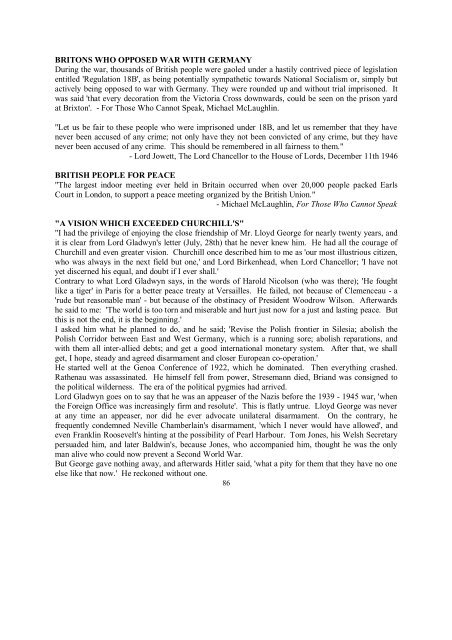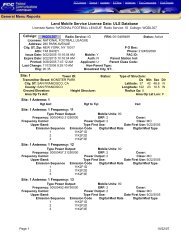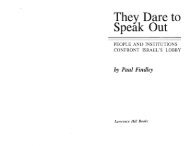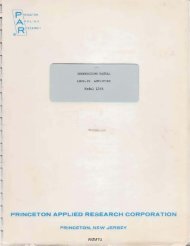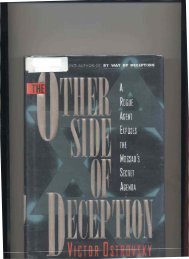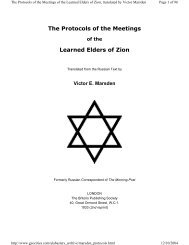Stands Among The World's Most Stands Among The ... - Index of
Stands Among The World's Most Stands Among The ... - Index of
Stands Among The World's Most Stands Among The ... - Index of
Create successful ePaper yourself
Turn your PDF publications into a flip-book with our unique Google optimized e-Paper software.
BRITONS WHO OPPOSED WAR WITH GERMANY<br />
During the war, thousands <strong>of</strong> British people were gaoled under a hastily contrived piece <strong>of</strong> legislation<br />
entitled 'Regulation 18B', as being potentially sympathetic towards National Socialism or, simply but<br />
actively being opposed to war with Germany. <strong>The</strong>y were rounded up and without trial imprisoned. It<br />
was said 'that every decoration from the Victoria Cross downwards, could be seen on the prison yard<br />
at Brixton'. - For Those Who Cannot Speak, Michael McLaughlin.<br />
"Let us be fair to these people who were imprisoned under 18B, and let us remember that they have<br />
never been accused <strong>of</strong> any crime; not only have they not been convicted <strong>of</strong> any crime, but they have<br />
never been accused <strong>of</strong> any crime. This should be remembered in all fairness to them."<br />
- Lord Jowett, <strong>The</strong> Lord Chancellor to the House <strong>of</strong> Lords, December 11th 1946<br />
BRITISH PEOPLE FOR PEACE<br />
"<strong>The</strong> largest indoor meeting ever held in Britain occurred when over 20,000 people packed Earls<br />
Court in London, to support a peace meeting organized by the British Union."<br />
- Michael McLaughlin, For Those Who Cannot Speak<br />
"A VISION WHICH EXCEEDED CHURCHILL'S"<br />
"I had the privilege <strong>of</strong> enjoying the close friendship <strong>of</strong> Mr. Lloyd George for nearly twenty years, and<br />
it is clear from Lord Gladwyn's letter (July, 28th) that he never knew him. He had all the courage <strong>of</strong><br />
Churchill and even greater vision. Churchill once described him to me as 'our most illustrious citizen,<br />
who was always in the next field but one,' and Lord Birkenhead, when Lord Chancellor; 'I have not<br />
yet discerned his equal, and doubt if I ever shall.'<br />
Contrary to what Lord Gladwyn says, in the words <strong>of</strong> Harold Nicolson (who was there); 'He fought<br />
like a tiger' in Paris for a better peace treaty at Versailles. He failed, not because <strong>of</strong> Clemenceau - a<br />
'rude but reasonable man' - but because <strong>of</strong> the obstinacy <strong>of</strong> President Woodrow Wilson. Afterwards<br />
he said to me: '<strong>The</strong> world is too torn and miserable and hurt just now for a just and lasting peace. But<br />
this is not the end, it is the beginning.'<br />
I asked him what he planned to do, and he said; 'Revise the Polish frontier in Silesia; abolish the<br />
Polish Corridor between East and West Germany, which is a running sore; abolish reparations, and<br />
with them all inter-allied debts; and get a good international monetary system. After that, we shall<br />
get, I hope, steady and agreed disarmament and closer European co-operation.'<br />
He started well at the Genoa Conference <strong>of</strong> 1922, which he dominated. <strong>The</strong>n everything crashed.<br />
Rathenau was assassinated. He himself fell from power, Stresemann died, Briand was consigned to<br />
the political wilderness. <strong>The</strong> era <strong>of</strong> the political pygmies had arrived.<br />
Lord Gladwyn goes on to say that he was an appeaser <strong>of</strong> the Nazis before the 1939 - 1945 war, 'when<br />
the Foreign Office was increasingly firm and resolute'. This is flatly untrue. Lloyd George was never<br />
at any time an appeaser, nor did he ever advocate unilateral disarmament. On the contrary, he<br />
frequently condemned Neville Chamberlain's disarmament, 'which I never would have allowed', and<br />
even Franklin Roosevelt's hinting at the possibility <strong>of</strong> Pearl Harbour. Tom Jones, his Welsh Secretary<br />
persuaded him, and later Baldwin's, because Jones, who accompanied him, thought he was the only<br />
man alive who could now prevent a Second World War.<br />
But George gave nothing away, and afterwards Hitler said, 'what a pity for them that they have no one<br />
else like that now.' He reckoned without one.<br />
86


